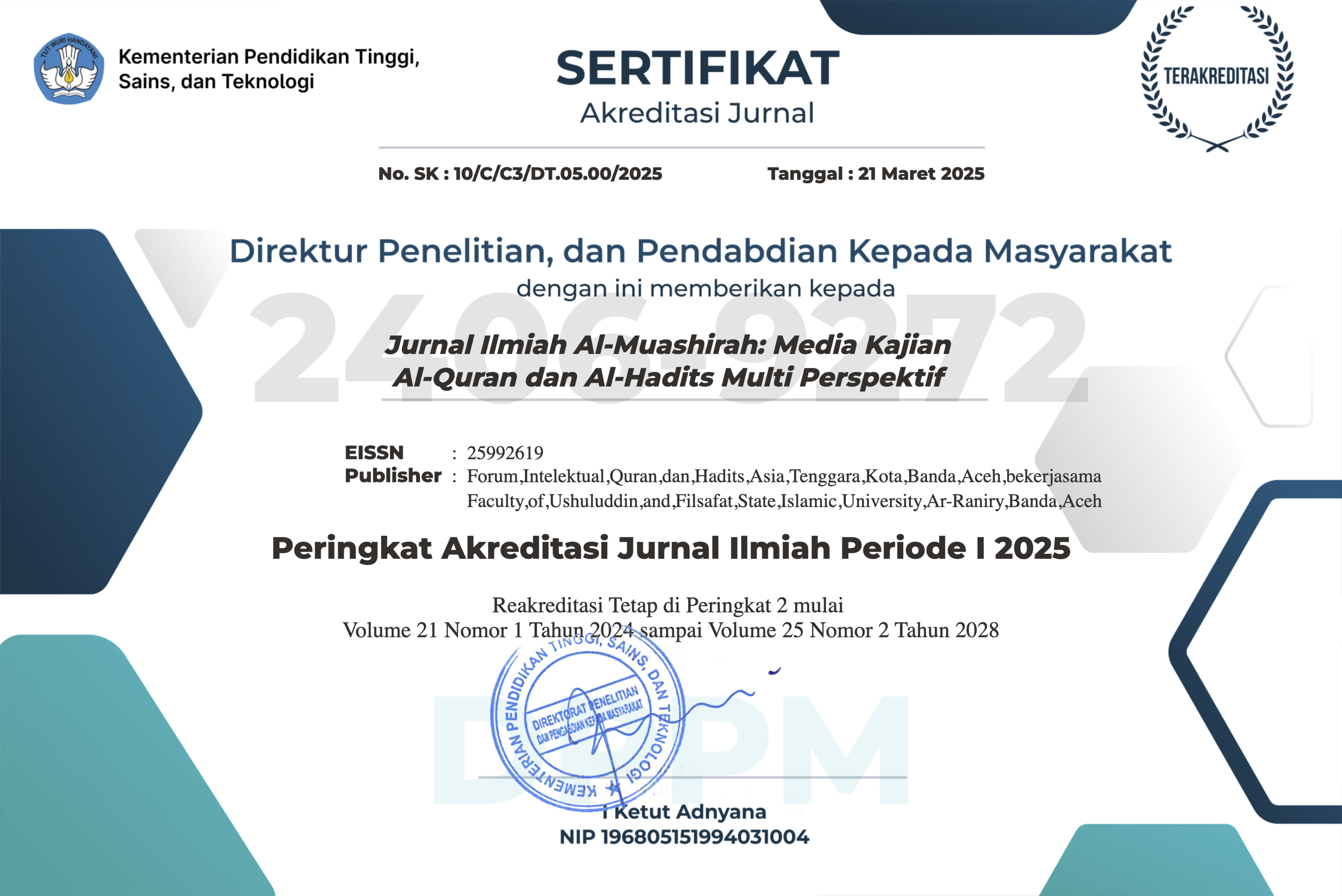CORAK PENAFSIRAN ISYARI DALAM TAFSIR JEMA'AT AHMADIYAH QADIYAN (Satu Analisa dalam Perspektif Ilmu Tafsir)
DOI:
https://doi.org/10.22373/jim.v13i2.2245Keywords:
Kata Kunci, Tafsir Ahmadiyah, Metode Isyari, Jemaat AhmadiyahAbstract
Ahmadiyah Qadiyan interpretation controversy has caused tremendous reaction from Muslims around the world, not only in his native land claimed as the Ahmadis non-Muslim minority, even in the Islamic world is considered heretical groups in and out of Islam. This fallacy stems from religious interpretations that do not comply with the disciplines of Islam, giving rise to different views in terms of religious principles. However, Ahmadiyah still claiming to be performer true religion of Islam, because in principle they still cling to the Qur'an and other Islamic scientific sources such as tradition, the views of prophet Muhammad companions and his followers. In addition they also have their own interpretation book is "THE HOLY QURAN ARABIC TEXT WITH ENGLISH TRANSLATION & SHORT COMMENTARY". Bayiruddin Mahmud Ahmad, the Ahmadiyya Caliph as the author of the commentary has made this interpretation tends to isyari patterns that seem to justify the prophetic claims of Ghulam Ahmad, by because it is necessary Overview of disciplines commentators to see the extent of the validity of the interpretation.Downloads
References
Abdul Ghafur Mahmud Mustafa Ja'far (2007), al-Tafsir wa al-Mufassirun. Kairo: Dar al-Salam.
Ahmad Cheema (2004), Khilafat Telah Berdiri. Parung: Jemaat Ahmadiyah Indonesia.
Adnan Zarzour (t.th), Majmuah al-Rasail al-Kamaliyah. Thaif: Maktabah al-Ma'arif.
Abu Ishak Ibrahim bin Musa asy-Syatibi (1975), al-Muwafaqat fi usul asy-Syariah. Mekkah:
Abu Ja'far Muhammad Ibn Jarir al-Tabari (1999), Jamiul al-Bayan An Ta'wil Ayat Qur'an.Beirut: Darul Fikri.
Abdul Ghafur Mahmud Mustafa Ja'far (2007), al-Tafsir wa al-Mufassirun. Kairo: Dar al-Salam.
Ahmad al-Syarbashi (1985), Kisah al-Tafsir (Mesir: al-Hai'ah al-Misriyah al-Ammah li al-Kitab.
Fauzi Deraman (2001), Pengantar usul Tafsir. Kuala Lumpur: Intel Media and Publication.
Farahwida Mohd Yusof dan Siti Ramlah Ibrahim (2008, Penyelewengan Ajaran Qadiyan .Johor: Universiti Teknologi Malaysia.
Hartono Ahmad Jaiz (2008), Aliran dan Faham Sesat di Indonesia. Jakarta Timur: Pustaka al-Kautsar.
Khairudin Said (2013), Gerbang Ushul Tafsir. Johor Bahru: Perniagaan Jahabersa.
Khalid Abdurrahman al-Ak (1994), Usul al-Tafsir wa Qawaiduh. Beirut: Dar al-Nafais.
Muhammad Husain al-Zahaby (1962), at-Tafsir wa al-Mufassirun. Kairo: Dar al-Kutub al-Haditsah.
Mirza Ghulam Ahmad (2013, Barahin Ahmadiyya.United Kingdom: Al-Shirkatul Ahmadiyyah Limited.
M.A Suryawan (2006), Bukan Sekedar Hitam Putih. Indonesia: Azzahra Publishing.
Muhammad Zafrullah Khan (1976), Tadhkirah: English Translation of the dreams, Visions and Verbal Revelations Vouchsafed to The Promised Messiah on Whom be Peace. London: Saffron Books.
Mirza Bashiruddin Mahmud Ahmad (1993), Introduction Of The Study of The Holy Qur'an Part I, terj. Syafi'i R. Batuah.Bogor: Yayasan Wisma Damai.
Muhammad Khidir Husain (1975), al-Qadiyaniah wa al-Bahaiyah. Kaherah:T.pt.
Mirza Ghulam Ahmad (1993), Barakatuddua, terj. Abdul Basith. Bogor: Jemaat Ahmadiyah Indonesia.
Mirza Basyiruddin Mahmud Ahmad (1992), Tafsir al-Kabir. United Kingdom: al-Syirkatul Islamiyah Islam Abad.
Muhammad Salim Abu Ashi (2003), Maqalatani Fi at-Takwil. Kairo: Dar al-Bashair.
Muhammad Abdul azim al-Zurqani (1995), Manahil irfan.Beirut: Dar al-Kutub al-Araby, 1995).
Muhammad Husain al-Zahaby (19620, at-Tafsir wa al-Mufassirun. Kairo: Dar al-Kutub al-Haditsah.
Muhyah Fannani, Metode Tafsir Ahmadiyah Qadian, Jurnal Teologia, Volum 19, Nomor 2, Juli 2008, 286.
Muchlis Hanafi (2011). Mengugat Ahmadiyah. Ciputat: Lentera Hati.
Nuruddin Itr (1996), Ulum al-Qur'an. Dimasyq: Matba'ah al-Shibl.
Nur-ud-Din Muneer (1988), Ahmadi Muslim, terj. Rani Saleh. Indonesia: PB Jemaat Ahmadiyah Indonesia.
Zafrullah Ahmad Pantoh et all (2003), Klarifikasi Telaah Buku Tazkirah. Kemang: Jema'at Ahmadiyah Indonesia.
Downloads
Published
Issue
Section
License
Authors who publish in Jurnal Ilmiah Al-Mu'ashirah agree to the following terms:
- Authors retain copyright and grant the journal right of first publication with the work simultaneously licensed under a Attribution-ShareAlike 4.0 International (CC BY-SA 4.0) License that allows others to share the work with an acknowledgment of the work's authorship and initial publication in this journal.
- Authors are able to enter into separate, additional contractual arrangements for the non-exclusive distribution of the journal's published version of the work (e.g., post it to an institutional repository or publish it in a book), with an acknowledgment of its initial publication in this journal.
- Authors are permitted and encouraged to post their work online (e.g., in institutional repositories or on their website) prior to and during the submission process, as it can lead to productive exchanges, as well as earlier and greater citation of published work (See The Effect of Open Access).













